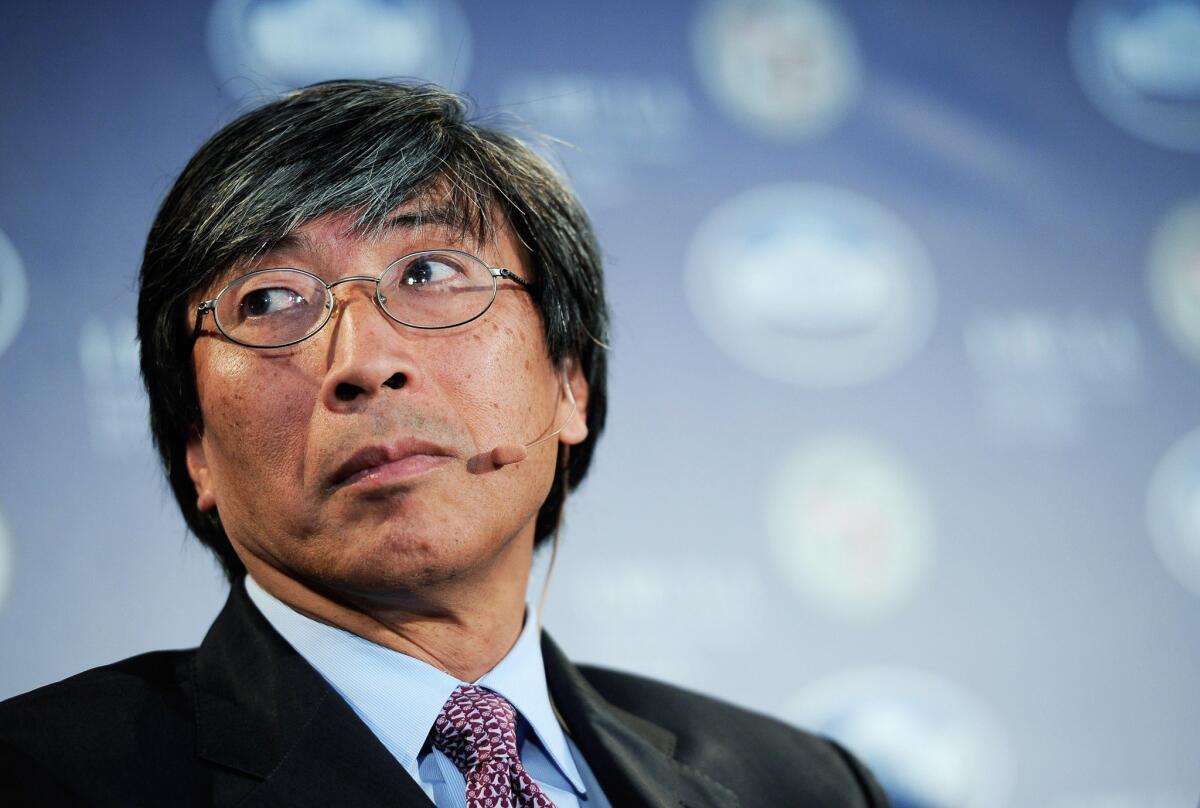Shares jump on IPO for Soon-Shiong start-up NantHealth

Shares of biotech start-up NantHealth, run by Los Angeles billionaire physician Patrick Soon-Shiong, had a strong first day of trading Thursday, closing 32% above their offer price.
The price of a NantHealth share closed at $18.59, up $4.59. NantHealth offered 6.5 million new shares at $14 a share, raising more than $90 million. That amounts to 5.5% of the company’s total shares after the offering. At the offer price, the company was valued at $1.65 billion.
NantHealth sells software and medical records systems to hospitals and other providers. It soon plans to commercially sell a cancer test that analyzes patients’ DNA to determine the best treatments.
The company is one of a collection of start-ups that Soon-Shiong operates from the Culver City headquarters of parent firm NantWorks.
“I’m pleased at the reaction to the IPO,” Soon-Shiong said in an interview Thursday morning.
In a regulatory filing, NantHealth said Soon-Shiong, its chairman and chief executive, would control about 58% or more of the company after the sale.
NantHealth’s first-day gains were “encouraging,” said Matt Kennedy, an analyst at Renaissance Capital, a manager of IPO exchange traded funds. But he noted that NantKwest, another of Soon-Shiong’s companies that went public last year, also had strong performance in its stock market debut and closed at nearly 40% higher than its offer price. NantKwest is now 70% below its offer price, he said.
NantKwest also now faces a lawsuit from investors after it announced it was restating its financial statements just months after selling shares in July.
Those accounting errors related, in part, to Soon-Shiong’s compensation package of stock and options, which NantKwest valued at almost $148 million, according to corporate filings.
“There is a lot of uncertainty around what sort of market share it can get,” Kennedy said of NantHealth. “It is a speculative play on a next-generation cancer test, so I think that after it’s traded for a few months, we’ll have a better idea of what investors see it’s actually worth.”
He said the stock’s strong first-day performance could be because of investor confidence in Soon-Shiong, his partnerships and his previous successes.
Some of NantHealth’s existing investors, including parties affiliated with Soon-Shiong, were interested in buying up to $70 million worth of the new shares, according to the filing.
Last month, Soon-Shiong invested $70.5 million in Tribune Publishing, the parent of the Los Angeles Times, becoming the newspaper company’s second-largest shareholder. He also holds a minority stake in the Los Angeles Lakers.
Founded in 2010, NantHealth already has accumulated more than $300 million in losses. The company explained in its public-offering statement that it expects the losses to continue. “We may never achieve or sustain profitability in the future,” the filing warned.
NantHealth is focused on the emerging field of personalized medicine, or using an individual’s health data to determine what medical care he or she needs.
One of NantHealth’s key products is the GPS Cancer test, which uses supercomputers to analyze the DNA of patients’ tumors in an attempt to find drugs that work against the disease.
The test is at the center of a research effort that Soon-Shiong calls the Cancer MoonShot 2020. In the work, a collaboration of hospitals, insurers and drug companies are focused on finding treatments that use the body’s own immune system to fight cancer.
The cancer test falls into a regulatory loophole and doesn’t need approval from the Food and Drug Administration under current rules.
The company said in the stock filing that NantHealth’s performance depends on its ability to “drive adoption” of the GPS Cancer test at price reimbursements from insurers that make it profitable.
NantHealth added that the test was “a novel and largely unproven approach.”
Judy Hanover, research director at market research firm IDC, said the product has a lot of potential but its integration into health systems’ workflows could prove challenging.
“I think it does need to become part of the diagnostic process and part of the workflow for physicians,” she said. “I think that’s their biggest hurdle.”
The NantHealth filing said Soon-Shiong is expected to “devote on average at least 20 hours per week” at the company, while “primarily” focusing on NantKwest.
The lead underwriter on the offering was Jefferies. NantHealth’s stock is listed on the Nasdaq exchange under the symbol NH.
UPDATES:
2:49 p.m.: This article was updated with additional analysis.
8:34 a.m.: This article was updated with the share price.
This article was originally published at 6:24 a.m.
More to Read
Inside the business of entertainment
The Wide Shot brings you news, analysis and insights on everything from streaming wars to production — and what it all means for the future.
You may occasionally receive promotional content from the Los Angeles Times.












